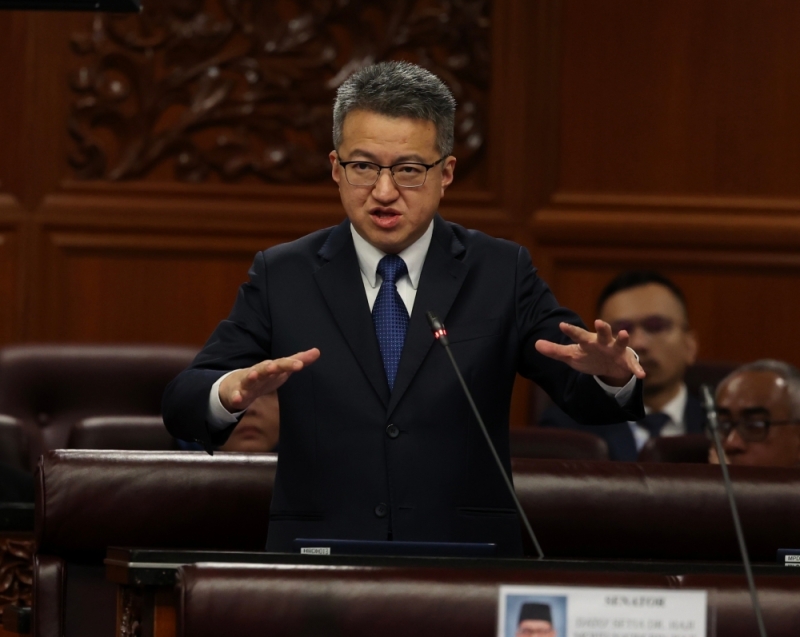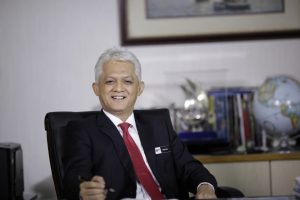
Malaysia’s International Trade and Industry Minister Mustapa Mohamed. | EPA/AHMAD YUSNI
After the failure to reach a EU-ASEAN Free Trade Agreement (FTA), Malaysia is entering serious negotiations with the European Commission for a bilateral agreement. The Asian country’s International Trade and Industry Minister Mustapa Mohamed spoke to New Europe about their hopes and ambitions.
New Europe: How is the EU-Malaysia deal progressing?
MM: We decided in October last year that we wanted to begin negotiations on a bilateral FTA and we gave ourselves 18 months to complete the deal. Before that, we were keen for an EU-ASEAN FTA, but because of Myanmar, it was impossible, so we wanted embark on a bilateral FTA. We’ve had three negotiations so far and the fourth is beginning now.
MM: We decided in October last year that we wanted to begin negotiations on a bilateral FTA and we gave ourselves 18 months to complete the deal. Before that, we were keen for an EU-ASEAN FTA, but because of Myanmar, it was impossible, so we wanted embark on a bilateral FTA. We’ve had three negotiations so far and the fourth is beginning now.
There has been progress and we’re beginning to talk about tariff reductions. We’ve requested that as soon as the agreement comes into force, we want 97% of tariffs to have duty free access.
There are some challenges, such as government procurement, because the EU wants access to the Malaysian market. There are issues around alcohol as we have high duties and the EU wants to see these much lower, but this is a difficult issue for us as we’re trying to discourage alcohol because Muslims are not allowed it. There are issues over livestock, where our religious requirements for halal needs to meet some stringent requirements. In the past few negotiations we’ve been trying to understand each others’ positions. There has been progress. I talked with the Commissioner and we’re likely to meet in Geneva, we will discuss progress. There will be two more negotiations before then.
Alcohol is an important issue, if duties go down to zero, there will be elements who will criticise that.
This will be a big political problem for us. We have resolved this with other countries. With one country, we signed a deal and agreed to review this issue a few years down the line, so we can deal with this issue.
This will be a big political problem for us. We have resolved this with other countries. With one country, we signed a deal and agreed to review this issue a few years down the line, so we can deal with this issue.
What has been your approach to the discussions?
We have decided on two things. One, we want a bilateral FTA with the EU, secondly, we’ve given ourselves a deadline of 18 months to achieve it. We are very positive, proactive, because we’re committed to sign a deal in less than a year’s time. We also want to protect our interests, as does the EU. In any negotiation, we start with two positions that are poles apart and the challenge is to being these positions closer together.
We have decided on two things. One, we want a bilateral FTA with the EU, secondly, we’ve given ourselves a deadline of 18 months to achieve it. We are very positive, proactive, because we’re committed to sign a deal in less than a year’s time. We also want to protect our interests, as does the EU. In any negotiation, we start with two positions that are poles apart and the challenge is to being these positions closer together.
What is it like to negotiate with the EU rather than, say, China or India?
The EU is a developed group of nations; it is advanced and has very high standards. Negotiating with the EU is different from negotiating with China, which is not very different to Malaysia, in terms of level of development, in terms of issues which are similar, but the EU has high standards, such as in the environment and labour. China is a developing country. The EU is a liberal democracy and we are a democracy too.
The EU is a developed group of nations; it is advanced and has very high standards. Negotiating with the EU is different from negotiating with China, which is not very different to Malaysia, in terms of level of development, in terms of issues which are similar, but the EU has high standards, such as in the environment and labour. China is a developing country. The EU is a liberal democracy and we are a democracy too.
This is not new for us, we’ve signed a number of deals with the developed world and the developing world.
There seems a flow towards Asia and Europe seems a little stagnant at the moment.
This is a known fact. It’s not a secret that Asia gas grown rapidly and China has overtaken Japan as the second largest economy. Asia is growing in power and influence. Against that, you have America, which is still struggling. Europe, still hasn’t recovered from the financial crisis, but having said that, Europe and America are still very strong.
This is a known fact. It’s not a secret that Asia gas grown rapidly and China has overtaken Japan as the second largest economy. Asia is growing in power and influence. Against that, you have America, which is still struggling. Europe, still hasn’t recovered from the financial crisis, but having said that, Europe and America are still very strong.
How do you feel about the failure of the EU-ASEAN deal, was the EU right to walk away or could there have been a different outcome?
In ASEAN we have a common position, which is, if you want to do anything with ASEAN it has to be with everyone and Myanmar is part of ASEAN. When this thing fell through, we had the view that there was nothing to prevent Malaysia having a bilateral agreement, but when it comes to having an ASEAN deal, it has to be with all 10 of us. We were disappointed when this deal fell through.
In ASEAN we have a common position, which is, if you want to do anything with ASEAN it has to be with everyone and Myanmar is part of ASEAN. When this thing fell through, we had the view that there was nothing to prevent Malaysia having a bilateral agreement, but when it comes to having an ASEAN deal, it has to be with all 10 of us. We were disappointed when this deal fell through.
Is the FTA a basis for further deals? How would you like to see it develop in the next couple of decades?
Europe is a very important trading partner for Malaysia. We depend on trade and the EU is very important for us, it is the third largest source of investment, behind Japan and China. Therefore we would like the FTA so we can have access to the EU market.
Europe is a very important trading partner for Malaysia. We depend on trade and the EU is very important for us, it is the third largest source of investment, behind Japan and China. Therefore we would like the FTA so we can have access to the EU market.
What ambitions do you have for increasing trade?
Trade, because of China and India’s rapid growth, has not been a s fast as with China, but it has been good. Last year, our trade with Europe grew by 10%, but our global trade grew by 18%. We hope to double the volume of trade with the EU by 2020.
Trade, because of China and India’s rapid growth, has not been a s fast as with China, but it has been good. Last year, our trade with Europe grew by 10%, but our global trade grew by 18%. We hope to double the volume of trade with the EU by 2020.
What would be the key parts of the FTA?
We want 97% of the tariffs to be at zero on day one of the treaty. Germany and France are the biggest investors. We’re also looking at investment in services and exporting more of them to Europe.
We want 97% of the tariffs to be at zero on day one of the treaty. Germany and France are the biggest investors. We’re also looking at investment in services and exporting more of them to Europe.
What are the benefits to Europe of this FTA?
Europe is also looking at increasing trade volume, and they would like to see better access for investors. They’re pushing us to accept European standards, these are some of the concessions they are looking for.
Europe is also looking at increasing trade volume, and they would like to see better access for investors. They’re pushing us to accept European standards, these are some of the concessions they are looking for.
How do you feel about the euro and its future?
The euro came into the world with a big bang and for a while it did extremely well, a lot better than the US dollar, but there have been concerns, and I think these concerns are legitimate. There is already friction in Europe, with Portugal, Greece and Ireland. Now there is also Italy, but we believe, in the longer term, this is temporary and Europe will put its house in order and the euro will be one of the major currencies in the world. It’s dangerous for the dollar to be the only major currency.
The euro came into the world with a big bang and for a while it did extremely well, a lot better than the US dollar, but there have been concerns, and I think these concerns are legitimate. There is already friction in Europe, with Portugal, Greece and Ireland. Now there is also Italy, but we believe, in the longer term, this is temporary and Europe will put its house in order and the euro will be one of the major currencies in the world. It’s dangerous for the dollar to be the only major currency.
In the longer term, it’s good for the world to have the euro as a counterweight to the dominance of the US dollar in trade payments.
How have relations been with the EU and how will they develop?
We wish we had stronger ties on investment, trade and education. It is inevitable that Europe will decline somewhat, because of the rise of China and Korea and ASEAN is coming up very well, so the importance of Europe will be stable, but we wish that the European economies will do better, because we’re a trading nation and we trade with them. We are disappointed that Europe is underperforming and we wish they would do better. That would be good for us.
We wish we had stronger ties on investment, trade and education. It is inevitable that Europe will decline somewhat, because of the rise of China and Korea and ASEAN is coming up very well, so the importance of Europe will be stable, but we wish that the European economies will do better, because we’re a trading nation and we trade with them. We are disappointed that Europe is underperforming and we wish they would do better. That would be good for us.
We used to be very dependent on Europe, but as the Asian economies grew, the decline of Europe, in relative terms, has been compensated by the growth in Asia.
If there are lessons to be learned, it is that it would be tough to have a single currency in ASEAN. There are people pushing for that, but with different levels of economic development, there’s a danger and it’s not going to happen for a long time.



